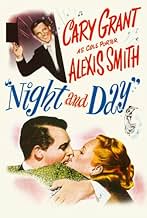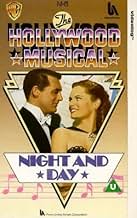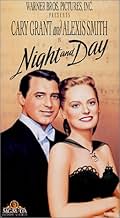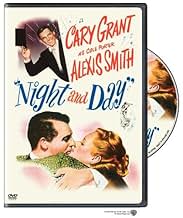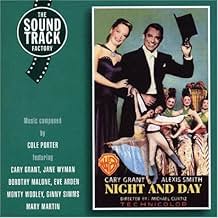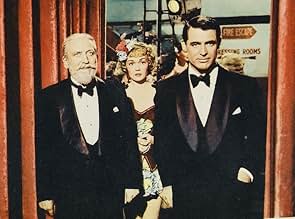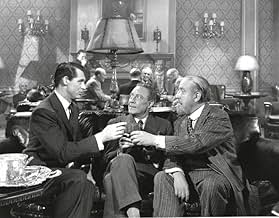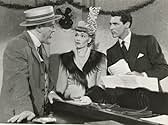VALUTAZIONE IMDb
6,1/10
3372
LA TUA VALUTAZIONE
Aggiungi una trama nella tua linguaA fictionalized biopic of composer Cole Porter from his days at Yale in the 1910s through the height of his success to the 1940s.A fictionalized biopic of composer Cole Porter from his days at Yale in the 1910s through the height of his success to the 1940s.A fictionalized biopic of composer Cole Porter from his days at Yale in the 1910s through the height of his success to the 1940s.
- Regia
- Sceneggiatura
- Star
- Candidato a 1 Oscar
- 2 candidature totali
Recensioni in evidenza
Good musical that could have been even better if it had better editing.Starts slow and then builds momentum.The directing style was inconsistent where in there are scenes that are top quality and then there are scenes that are just done in a rushed and sloppy way which is weird because those bungled scenes are those that are easily done.Despite these faults,the MUSIC here to any big music fan will certainly encourage you to forgive and enjoy.Grant is very stiff here but this is due to his capturing Porter's mannerisms.The biography is toned down/adjusted to Porter's version for the mainstream audience,so if one really wishes to dig into his real life which is very x-rated stuff,read his bio books instead.The production of this film coupled with it's great music will be great for one who wants uncontroversial musical entertertainment.I love the 1940's color technique here too.Only for early 2oth century POP music fans and big fans of the lead actors......
I haven't seen DE LOVELY, the new musical biopic about Cole Porter's life -- the movie trailer convinced me it would be as terrible as the reviews say it is. But Stephen Holden's pan in the N.Y. Times caused me to want to see NIGHT AND DAY again since he thought that for all its fraudulence, it caught something right about Porter's life and times. Having seen it recently for the first time since childhood, I can see what he meant. Evidently everything in it is a lie. Okay. Standard for Hollywood biopics.
The more important thing it gets wrong is the music, which for the most part is not handled well. In this period, Warner Bros. did not have talented singer/dancers under contract and it shows here. Ginny Simms is an accomplished if mechanical singer, Jane Wyman a passable one, but neither dances and neither dazzles. Mary Martin had talent and charm but not the looks nor the sparkle to come across well on film. When dancing is called for we get dull, pretentious ballroom/acrobatic routines from anonymous performers. This film needed the kind of musical talent MGM had under contract, and that lack of talent and zip makes for a musically mediocre film despite the fantastic Porter song catalog.
What the film got weirdly right was the casting of Cary Grant because either by his choice or director Michael Curtiz's design, Grant's withholding, enigmatic performance is intriguing, and does most of the work of spelling out 'the gay thing' for audiences in the know then and now. DE LOVELY may well be frank about the fact that Porter was gay, but gay audiences would have gotten the point in NIGHT AND DAY anyway. Lovely, elegant, chilly Alexis Smith does all the pursuing in the film, as do the other women, and yet Cole is charmingly evasive with all of them. They want him -- who wouldn't want to sleep with Cary Grant at the peak of his beauty? -- but he doesn't seem to care about anything but his music. Hmmmm. Where have we heard that before? Even when Linda/Alexis lands him, he's never really hers, he always seems to have his mind and heart elsewhere. There is absolutely no suggestion anywhere in this film that there was intense passion, emotion or love on his side of this relationship, which is unusual in this period. Rather their marriage seems to be a companionable one of mutual respect, which was apparently the case in real life. When Linda/Alexis gets fed up with being neglected in favor of Cole's work, we can also imagine that an endless supply of bellmen, sailors and chorus boys may have had something to do with it as well. The movie can't say this, but it leaves enough space and question marks for the audience to fill in the blanks. And we do.
Even at the end, with Porter being honored back at Yale with the (all male) glee club singing the glorious "Night and Day" and Linda walks in and she and Cole meet again on the brick patio in the moonlight, Grant doesn't kiss her except for a chaste peck on the cheek. Once again, as throughout the film, he is the passive object of her desire and he hardly seems to care. This performance as much as his work in the excellent NOTORIOUS suggests the coldness and misogyny that sometimes lurk in his screen persona. It's explicit in SUSPICION and NOTORIOUS, Hitchcock was exploring it there, but it's actually implicit in NIGHT AND DAY in every closeup where Grant looks simultaneously gorgeous and conflicted. How hard it must have been to be this beautiful and this uneasy about it.
I concur with those here who find the print currently on view on TCM as sub-par. A new DVD is out on NIGHT AND DAY and TCM would do well to show this in future. Meanwhile, feel free to check this picture out to see an example of screenwriters, a director and a star who work hard to suggest what they cannot actually say.
The more important thing it gets wrong is the music, which for the most part is not handled well. In this period, Warner Bros. did not have talented singer/dancers under contract and it shows here. Ginny Simms is an accomplished if mechanical singer, Jane Wyman a passable one, but neither dances and neither dazzles. Mary Martin had talent and charm but not the looks nor the sparkle to come across well on film. When dancing is called for we get dull, pretentious ballroom/acrobatic routines from anonymous performers. This film needed the kind of musical talent MGM had under contract, and that lack of talent and zip makes for a musically mediocre film despite the fantastic Porter song catalog.
What the film got weirdly right was the casting of Cary Grant because either by his choice or director Michael Curtiz's design, Grant's withholding, enigmatic performance is intriguing, and does most of the work of spelling out 'the gay thing' for audiences in the know then and now. DE LOVELY may well be frank about the fact that Porter was gay, but gay audiences would have gotten the point in NIGHT AND DAY anyway. Lovely, elegant, chilly Alexis Smith does all the pursuing in the film, as do the other women, and yet Cole is charmingly evasive with all of them. They want him -- who wouldn't want to sleep with Cary Grant at the peak of his beauty? -- but he doesn't seem to care about anything but his music. Hmmmm. Where have we heard that before? Even when Linda/Alexis lands him, he's never really hers, he always seems to have his mind and heart elsewhere. There is absolutely no suggestion anywhere in this film that there was intense passion, emotion or love on his side of this relationship, which is unusual in this period. Rather their marriage seems to be a companionable one of mutual respect, which was apparently the case in real life. When Linda/Alexis gets fed up with being neglected in favor of Cole's work, we can also imagine that an endless supply of bellmen, sailors and chorus boys may have had something to do with it as well. The movie can't say this, but it leaves enough space and question marks for the audience to fill in the blanks. And we do.
Even at the end, with Porter being honored back at Yale with the (all male) glee club singing the glorious "Night and Day" and Linda walks in and she and Cole meet again on the brick patio in the moonlight, Grant doesn't kiss her except for a chaste peck on the cheek. Once again, as throughout the film, he is the passive object of her desire and he hardly seems to care. This performance as much as his work in the excellent NOTORIOUS suggests the coldness and misogyny that sometimes lurk in his screen persona. It's explicit in SUSPICION and NOTORIOUS, Hitchcock was exploring it there, but it's actually implicit in NIGHT AND DAY in every closeup where Grant looks simultaneously gorgeous and conflicted. How hard it must have been to be this beautiful and this uneasy about it.
I concur with those here who find the print currently on view on TCM as sub-par. A new DVD is out on NIGHT AND DAY and TCM would do well to show this in future. Meanwhile, feel free to check this picture out to see an example of screenwriters, a director and a star who work hard to suggest what they cannot actually say.
One of Broadway's most brilliant songwriters, Cole Porter (1891-1964) worked hard to present an unflappable image to the world--but in truth he was a tremendously complex man, a homosexual who lived with wife Linda Lee Thomas in a marriage of convenience, subject fits of depression, and suffering horrific pain in the wake of a horseback riding accident which left him crippled at the peak of his career. Add to this the fact that his lyrics were often censored for film, radio, and records and it seems very odd that 1940s Hollywood would attempt a biography. What they did, of course, was fictionalize it to the max, reducing the story of his life to a mix of backstage musical and domestic drama--and transforming the tiny and waspish Porter and his icy bride Linda into handsome Cary Grant and lovely Alexis Smith. The result is pure nonsense, of course, but when you tack in a host of Porter classics--fantasy it might be, but it is entertaining enough to watch.
Grant is no singer, but he has considerable charm, and Smith is as always extremely attractive. The supporting cast is remarkably strong, featuring the likes of Jane Wyman, Eve Arden, Dorothy Malone, and Alan Hale--and rare screen appearances by Monty Woolley and Mary Martin, who deliver knockout performances of "Miss Otis Regrets" and "My Heart Belongs To Daddy" respectively. The DVD transfer is reasonable, and although the bonuses are pure fluff they are amusing. While it may be short on fact with a story little more than pure melodrama, the music and performers make NIGHT AND DAY a reasonably pleasant way to spend a rainy afternoon.
Gary F. Taylor, GFT, Amazon Reviewer
Grant is no singer, but he has considerable charm, and Smith is as always extremely attractive. The supporting cast is remarkably strong, featuring the likes of Jane Wyman, Eve Arden, Dorothy Malone, and Alan Hale--and rare screen appearances by Monty Woolley and Mary Martin, who deliver knockout performances of "Miss Otis Regrets" and "My Heart Belongs To Daddy" respectively. The DVD transfer is reasonable, and although the bonuses are pure fluff they are amusing. While it may be short on fact with a story little more than pure melodrama, the music and performers make NIGHT AND DAY a reasonably pleasant way to spend a rainy afternoon.
Gary F. Taylor, GFT, Amazon Reviewer
If you want a biography of Cole Porter you better go to the library, you won't find it here. This is a highly entertaining but strictly fictional version of his life--played by no less than Cary Grant, in his usual debonair style, perhaps just a shade understated so as to appear more like Porter. Whatever, he's still Cary Grant (playing himself in a minor key) and since the music is what makes this film tick, you'll forgive whatever liberties the scriptwriters have taken. It all looks wonderful in glowing technicolor.
Alexis Smith never was able to make a warm presence on the screen despite her talent and striking good looks. She seems even more remote here as the woman Porter woos and marries. Monty Woolley has a fine time playing himself. The musical moments are handled nicely by some talented people: Ginny Simms, Eve Arden, Jane Wyman and Mary Martin doing her "My Heart Belongs to Daddy" routine. All of the Porter standards are nicely done.
Interesting tidbit: Was Oscar nominated for "Best Scoring of a Musical" but lost to "The Jolson Story".
Relaxing entertainment. Just don't expect a truthful bio.
Alexis Smith never was able to make a warm presence on the screen despite her talent and striking good looks. She seems even more remote here as the woman Porter woos and marries. Monty Woolley has a fine time playing himself. The musical moments are handled nicely by some talented people: Ginny Simms, Eve Arden, Jane Wyman and Mary Martin doing her "My Heart Belongs to Daddy" routine. All of the Porter standards are nicely done.
Interesting tidbit: Was Oscar nominated for "Best Scoring of a Musical" but lost to "The Jolson Story".
Relaxing entertainment. Just don't expect a truthful bio.
Unlike film biographies of George Gershwin, Jerome Kern, and Sigmund Romberg or for that matter Rodgers&Hart, those artists were gone by the time the silver screen told their stories. But Cole Porter was very much still with us when Night and Day was released in 1946 and some of his best work was yet to come.
If Cole Porter had his druthers Cary Grant would never have played the part of himself. Porter fancied himself as more the Fred Astaire type. But given the nature of what happened to Porter in his life, a dancing Cole Porter was out of the question.
There's not too much that's accurate in this film. Cole Porter was born and raised in Indiana in affluent surroundings. Yes he went to Yale and his best and lifelong friend that he acquired from Yale was Monty Woolley. Yes he did marry the older and glamorous Linda Lee Thomas. And yes he composed some of the most beautiful and sophisticated songs ever done.
Of course his marriage to Linda Lee was a sham. In the vernacular of the time Linda served as his beard, his cover as it were because Cole Porter was gay. As was his lifelong friend Monty Woolley.
Were they ever involved with each other. Maybe as youths, but from what I've heard their tastes were different. Porter liked his male partners as sophisticated as he was and as beautiful as his songs were. Monty on the other hand was known for picking up street kids from Maine to California until he died.
One thing that was true although glamorized for the film, Porter did serve in the French army during World War I. No wounds however, no hearing of African rhythms from Senegalese troops were he got the idea for Night and Day.
Night and Day sure jumbles up even the order of his shows. Porter was writing songs from before Yale, but he did not score a commercial musical comedy hit until the show Paris in 1928 where the song Let's Do It was featured. I sure didn't know that In the Still of the Night was originally done as a Christmas Carol way back in his youth for instance.
In fact Where the Still of the Night, along with I've Got You Under My Skin, Rosalie, and Easy to Love were all written for MGM musicals. You can take it to the bank that Louis B. Mayer soaked Jack Warner for plenty to get those songs heard in a Warner Brothers film. Similarly the title song Night and Day, heard in The Gay Divorce on Broadway first, made its screen debut in RKO's The Gay Divorcée. Jack Warner must have paid RKO plenty for that one also.
The other true thing is the fall from a horse that Porter suffered in the late thirties, the constant pain he was in all of his life. It took 28 operations to save his legs back in the thirties. In 1958 long after the story in the film ended, Porter did eventually lose a leg and from then on lived as a recluse in his suite at the Waldorf Towers. Linda Lee Thomas Porter had passed away about a decade before.
Alexis Smith plays Linda Lee here and the cast of Night and Day also includes Jane Wyman, Dorothy Malone, Selena Royle, Tom D'Andrea, Henry Stephenson, Donald Woods. Playing themselves are Mary Martin and Monty Woolley. Singer Ginny Simms of the Kay Kyser band sang many of the Porter tunes for the film.
Night and Day certainly captures Porter's sophistication. Of course the gay lifestyle and a pretty hedonistic one at that which Porter led would not be shown at all back in the days of the Code. Some might complain about that pleasure driven pursuit that Porter had his whole life. If he sought beauty and pleasure in the world, Cole Porter certainly gave enough of it back to the world to justify it.
After Night and Day, Cole Porter had still yet to write such film scores as The Pirate, High Society, and Les Girls and such Broadway shows as Kiss Me Kate, Out of this Wolrd, Can-Can, and Silk Stockings. You could score a film with just the material he had yet to write.
It's not a great biographical film, but Night and Day provides as good an excuse as any to listen and appreciate the art that was Cole Porter.
If Cole Porter had his druthers Cary Grant would never have played the part of himself. Porter fancied himself as more the Fred Astaire type. But given the nature of what happened to Porter in his life, a dancing Cole Porter was out of the question.
There's not too much that's accurate in this film. Cole Porter was born and raised in Indiana in affluent surroundings. Yes he went to Yale and his best and lifelong friend that he acquired from Yale was Monty Woolley. Yes he did marry the older and glamorous Linda Lee Thomas. And yes he composed some of the most beautiful and sophisticated songs ever done.
Of course his marriage to Linda Lee was a sham. In the vernacular of the time Linda served as his beard, his cover as it were because Cole Porter was gay. As was his lifelong friend Monty Woolley.
Were they ever involved with each other. Maybe as youths, but from what I've heard their tastes were different. Porter liked his male partners as sophisticated as he was and as beautiful as his songs were. Monty on the other hand was known for picking up street kids from Maine to California until he died.
One thing that was true although glamorized for the film, Porter did serve in the French army during World War I. No wounds however, no hearing of African rhythms from Senegalese troops were he got the idea for Night and Day.
Night and Day sure jumbles up even the order of his shows. Porter was writing songs from before Yale, but he did not score a commercial musical comedy hit until the show Paris in 1928 where the song Let's Do It was featured. I sure didn't know that In the Still of the Night was originally done as a Christmas Carol way back in his youth for instance.
In fact Where the Still of the Night, along with I've Got You Under My Skin, Rosalie, and Easy to Love were all written for MGM musicals. You can take it to the bank that Louis B. Mayer soaked Jack Warner for plenty to get those songs heard in a Warner Brothers film. Similarly the title song Night and Day, heard in The Gay Divorce on Broadway first, made its screen debut in RKO's The Gay Divorcée. Jack Warner must have paid RKO plenty for that one also.
The other true thing is the fall from a horse that Porter suffered in the late thirties, the constant pain he was in all of his life. It took 28 operations to save his legs back in the thirties. In 1958 long after the story in the film ended, Porter did eventually lose a leg and from then on lived as a recluse in his suite at the Waldorf Towers. Linda Lee Thomas Porter had passed away about a decade before.
Alexis Smith plays Linda Lee here and the cast of Night and Day also includes Jane Wyman, Dorothy Malone, Selena Royle, Tom D'Andrea, Henry Stephenson, Donald Woods. Playing themselves are Mary Martin and Monty Woolley. Singer Ginny Simms of the Kay Kyser band sang many of the Porter tunes for the film.
Night and Day certainly captures Porter's sophistication. Of course the gay lifestyle and a pretty hedonistic one at that which Porter led would not be shown at all back in the days of the Code. Some might complain about that pleasure driven pursuit that Porter had his whole life. If he sought beauty and pleasure in the world, Cole Porter certainly gave enough of it back to the world to justify it.
After Night and Day, Cole Porter had still yet to write such film scores as The Pirate, High Society, and Les Girls and such Broadway shows as Kiss Me Kate, Out of this Wolrd, Can-Can, and Silk Stockings. You could score a film with just the material he had yet to write.
It's not a great biographical film, but Night and Day provides as good an excuse as any to listen and appreciate the art that was Cole Porter.
Lo sapevi?
- QuizAfter attending the premiere of the film, Cole Porter supposedly remarked to his wife, Linda, "if I could survive that, I can survive anything."
- BlooperWhen in England, there are street performers singing "Rosalie". The accordion player's hands never press the keys; in fact, his right hand is static throughout the whole scene.
- Citazioni
Monty Woolley: Haven't you ever wanted to be alone?
Gracie Harris: Yes, but with somebody.
- ConnessioniEdited from Don't Fence Me In (1945)
- Colonne sonoreNight and Day
(1932) (uncredited)
Written by Cole Porter
Played during the opening credits and often in the score
Sung by Bill Days
Reprised by passengers on a train
I più visti
Accedi per valutare e creare un elenco di titoli salvati per ottenere consigli personalizzati
- How long is Night and Day?Powered by Alexa
Dettagli
Botteghino
- Budget
- 4.445.000 USD (previsto)
- Tempo di esecuzione2 ore 8 minuti
- Proporzioni
- 1.37 : 1
Contribuisci a questa pagina
Suggerisci una modifica o aggiungi i contenuti mancanti

Divario superiore
By what name was Notte e dì (1946) officially released in India in English?
Rispondi

